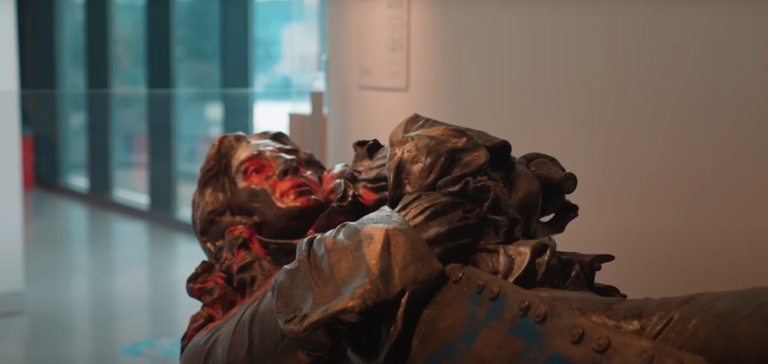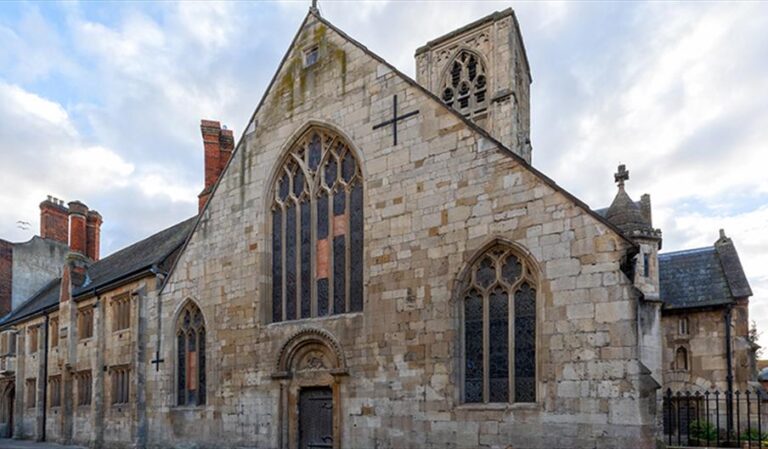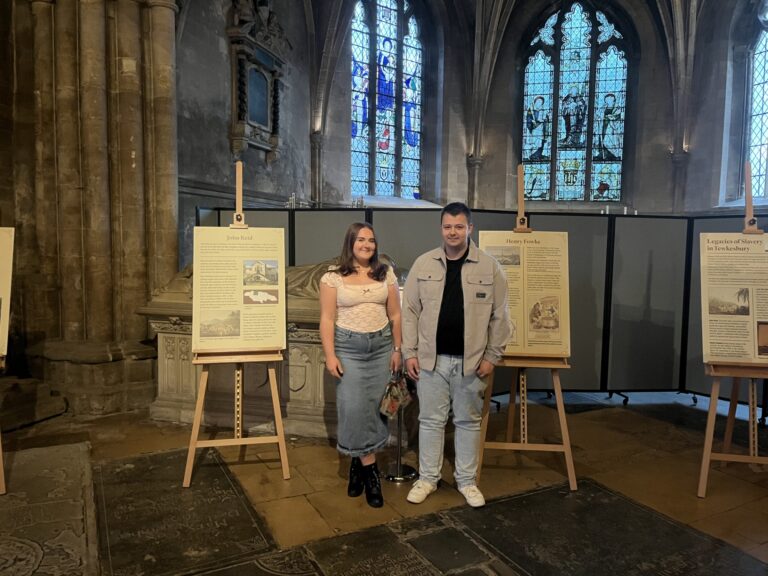| CC4HH
The Diaries of Denis Gibbs: A british officer in WWII
This project presents an examination of the private diaries of Denis Gibbs, a British Officer in the Royal Corps of Signals in WWII, and features a short film. The never seen before diaries were given to the History department at the University of Gloucestershire by Denis’ son, Peter Gibbs. They were discovered after Denis’ death in 2020, and provide a fascinating insight into an individual’s experiences of war. History students David Morgan, Layla Harrison and Aimee Dorrington produced this film as part of their work for the Cotswold Centre for History & Heritage.
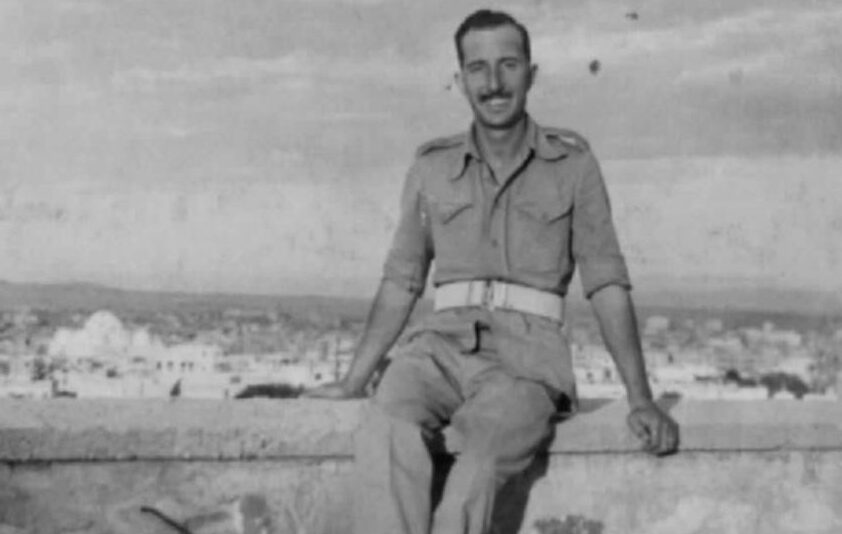
contents
Who was Denis Gibbs?
Denis Gibbs was born on 19 June 1917 to Charles and Alice Gibbs in Clapham, South London. Denis was a very intelligent man whose life-long passion for learning meant he gained a place at Oxford University prior to the Second World War. He was a well-spoken and well-written man, priding himself on being a gentleman, never failing to shake hands with those he met and always took care in his appearance. He valued family and was very close to his younger brother who visited him a number of times whilst he was serving overseas.
After serving as a stretcher bearer in London in the early days of the war, Denis was first drafted into the Army Dental Corps, before applying to become an officer cadet in the Royal Corps of Signals. He was first stationed in Aldershot for training which he described as ‘the hardest nine months of his life’.
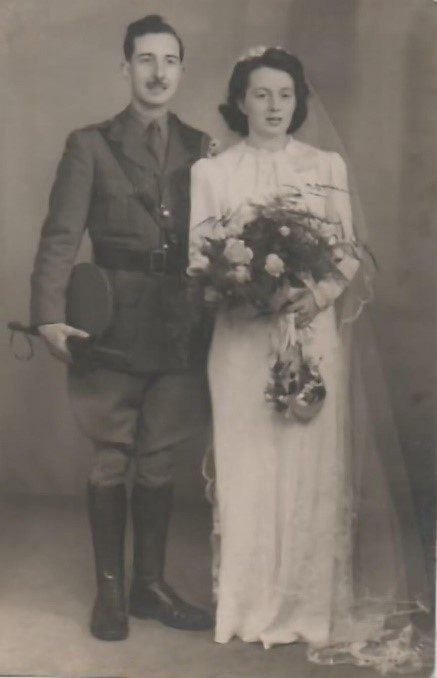
Denis was later relocated to Banbury, Oxfordshire, for his training where he met his future wife, Eileen. He described their meeting and romance as ‘the stuff dreams are made of’. They were married in October 1941 (pic left), they had three children together, with their first son, Christopher, born before Denis was sent overseas. However, their second child Peter, was born whilst Denis was stationed in North Africa. News of this new arrival, which came as a great shock, came via his brother Lionel Allen (Dick), who was also stationed in Africa whilst serving with the RAF. In his diaries, Denis wrote about his fears for the future, apologising to Eileen for leaving her with two young children, whilst also worrying about how would ‘afford it’.
The Diaries
Denis hand wrote two diaries about his experiences of war, one in 1943 and the other spanning 1944-45. His writings offer a rich tapestry of insights into the complexities of war and the socio-political landscape of the era. Central to Denis’ writing were vivid descriptions of the various places he visited while on and off duty. A dominant theme in Denis’ entries is the profound love, loyalty, and honour to England. There is a moving sense of wistfulness for the past and what he is missing at home. This is demonstrated in his fond recollection of holidays.
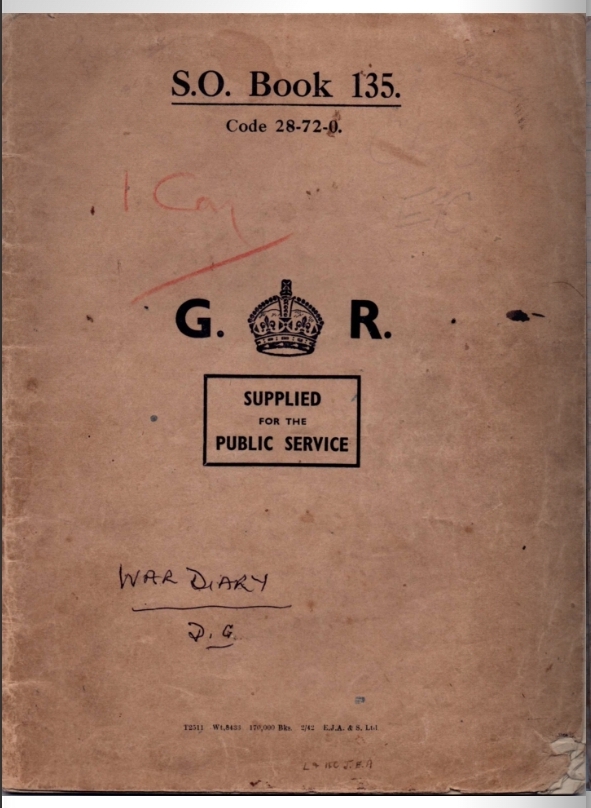
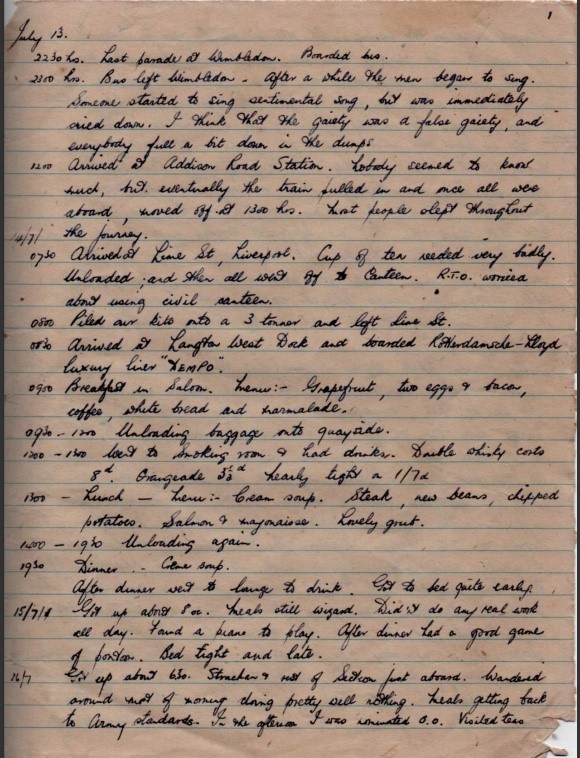
Denis’ duties included tasks such as maintaining and re-building communication infrastructure, as well as operating signals that were damaged during the conflict. This kind of work meant that Denis saw little fighting on the front lines, and subsequently had a lot of free time to fill. In the first diary, we discover that Denis occupied a great deal of his free time with music. He reflects on several instances where he would play any piano he could find along his travels. He would continue to do this regardless of the risk to his rank and position. This desire to entertain himself, even if it meant risking his position, speaks volumes of soldiers’ need for stimulation whilst away from home. Following further research, we found that many other soldiers used music as an escape from the reality of war.
Curating the Project
Curating the project has been a very interesting journey. In January 2024, David, Layla and Aimee were given the project as part of the HM5400 History in Practice module, where students engage in local history project work for the Cotswold Centre for History and Heritage. They were tasked with producing a public exhibition as part of the assignment. However, from that day this project just continued to grow in a way that surprised everyone involved.
From the start, David, Layla and Aimee regularly met up with Peter and Merle Gibbs (Denis’ son and Daughter-in-Law) over a coffee, to try and understand Denis’ background. These meetings gave the team lots of valuable information which they used to interpret the diaries. Anecdotes of Denis’ later life helped the team understand Denis a little more. The team also decided to transcribe the two diaries, meticulously copying the diaries word-for-word in order to make them more accessible to the general public. The team dedicated hours to this and hope to publish an edited version of the diaries in the near future.
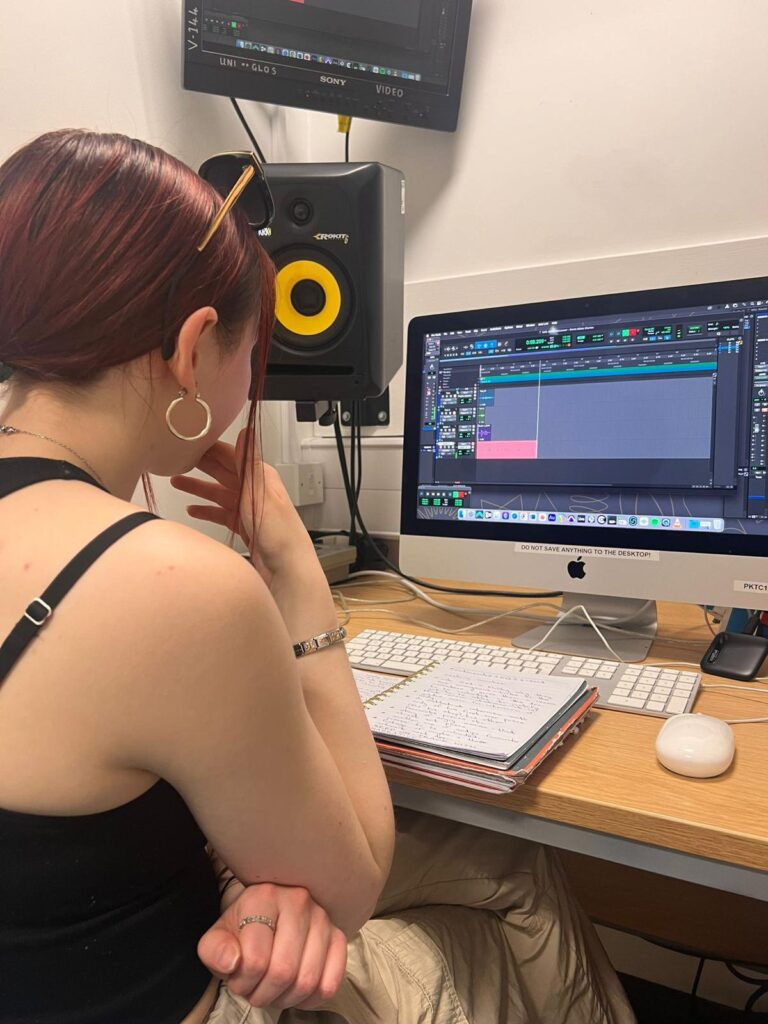
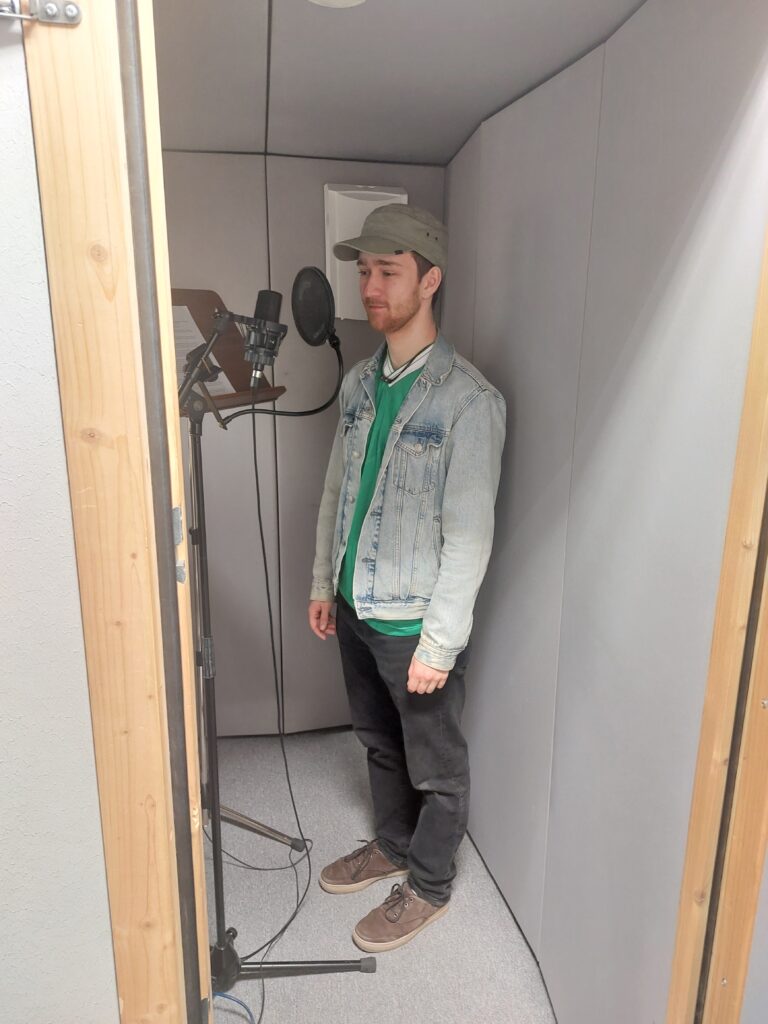
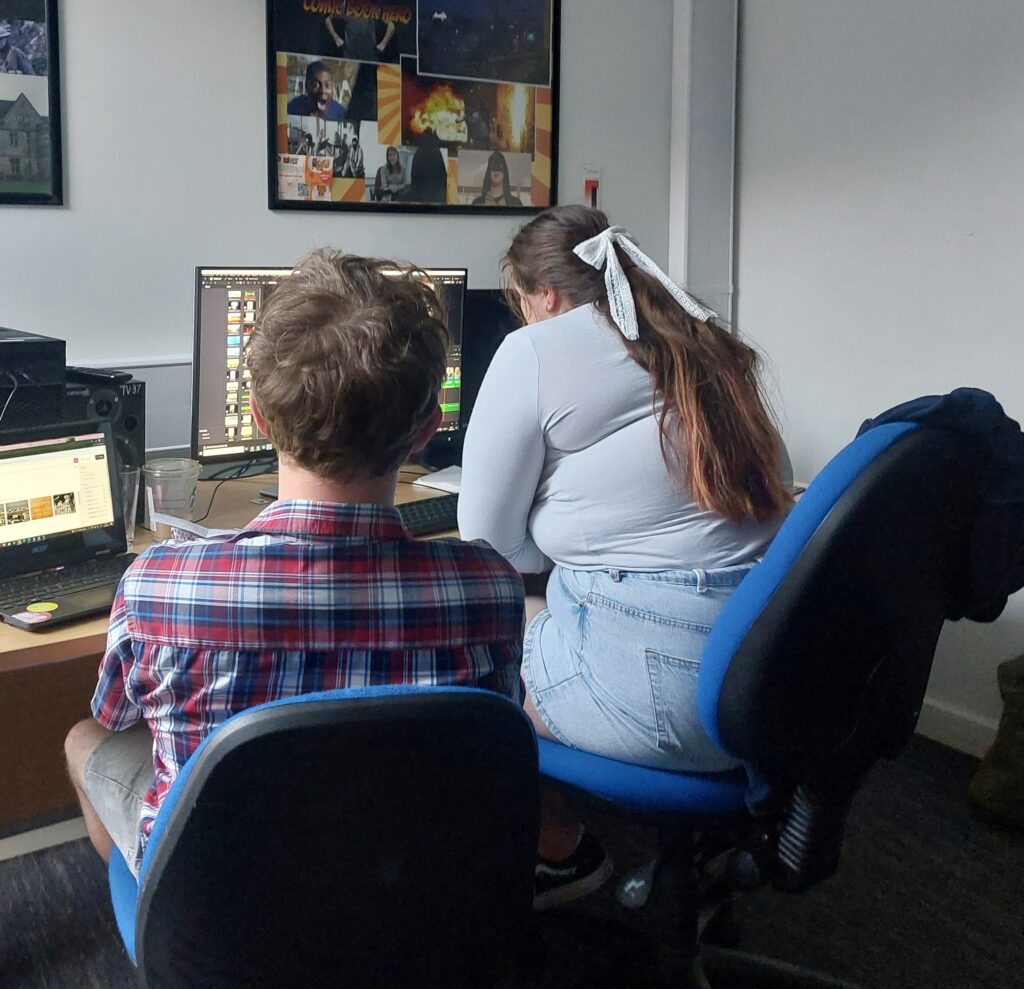
Analyzing the diaries took the trio down very different paths. Aimee focused on the the theme of patriotism within the diaries; Layla analysed the various ways in which Denis and his companions made use of their downtime; whereas David looked into the diaries’ portrayal of the relationship between the British Soldiers and the Italian Prisoners of War.
Their individual research areas all contributed towards the production of the film in order to give a 10-minute snapshot of Denis’ experiences of war. With help from Ruby Hatcliff, Sophie Goodhead and Amber Gilston (BA Television Production), Layla was able to lead the team in editing the footage they had. However, choosing what to include within the video proved the hardest task for the team, who spent hours mapping out the order of sections, debating what to include and what to leave out.
The Film
After around 60 hours in an editing room, the video was finally premiered to the public at the Diaries of Denis Gibbs Screening and Exhibition (19 June 2024).
Diaries of Denis Gibbs Screening and Exhibition – 19 June 2024
The team organised a screening and exhibition on the project which was attended by around 70 people, which included members of the Royal Corps of Signals, Denis’ family, historians and members of the public. A committee was assembled to curate three parts of the exhibition. The first consisted of Denis’ personal possessions and items related to his life; the second section was a display of artefacts on the home front featuring items from the Lilian Morgan Home Front Collection; the final section covered the making of the Denis Gibbs project, which showed the process behind the entire event. The team also took questions from the audience about their involvement in the project and how Denis’ perspective on war had impacted their research.
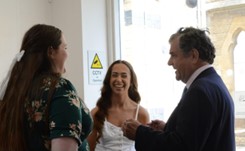
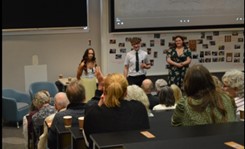
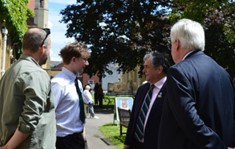
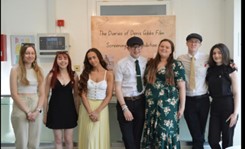
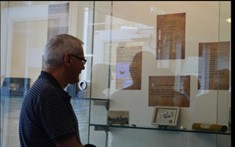
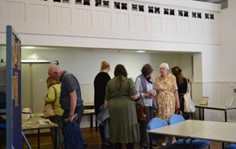
Presenting at the Gloucester History Festival in September 2024
Following conversations with the curator of the Gloucester History Festival, the team were invited to exhibit the project at Blackfriars Priory for the 2024 festival. They designed four panels which charted Denis’ life and gave insights into the diaries. Illuminating Denis’ story within this small space was difficult as they had to ensure the important information from their research communicated clearly to give the public an immersive experience.
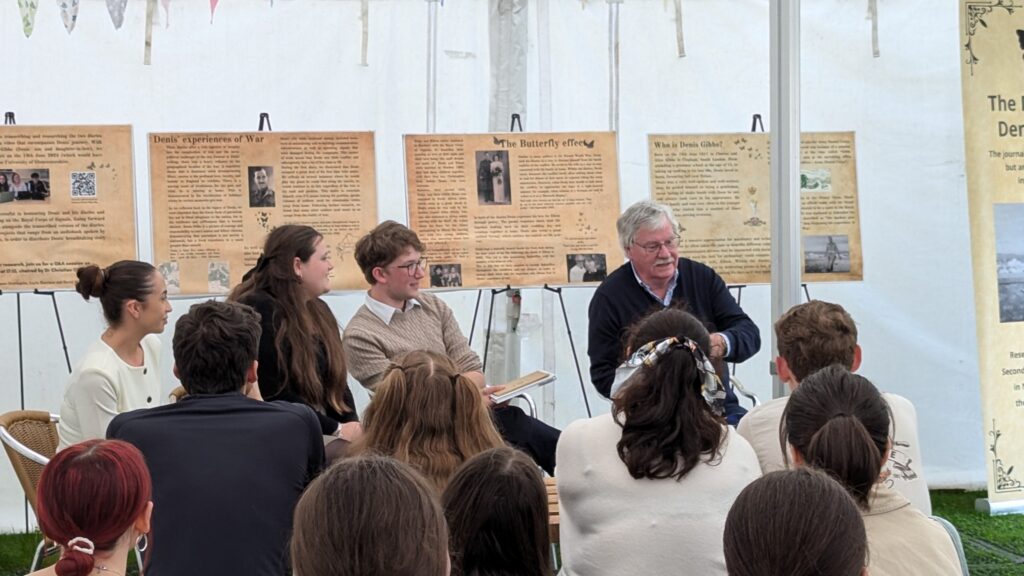
David, Layla and Aimee alongside Peter Gibbs, chaired by Dr Christian O’Connell, also gave a talk and Q&A on the diaries. This allowed them to further the outreach of the project and gain an insight from the public on how they perceived the project. We had some very interesting questions which have helped them in continuing their analysis of the diaries.
The Research Team

Aimee has a particular passion for the history of the Middle East, wishing to further her interest through continued research into the region. Aimee also aims to complete a PGCE allowing her to become a Primary School teacher in the near future, combining her love of history and education. In her free time, Aimee’s main hobby is floristry.
For Layla, the project has sparked a keen interest in public history and has pushed her to pursue postgraduate study within the field. At present her focus within history revolves around women and their partners. Finding inspiration in individual stories, particularly in relationships. In her free time, Layla enjoys cooking and baking, using these activities as a calming escape during demanding academic periods.
David’s research primarily looks at the Second World War and how the war has been interpreted in diaries and news reports. David is also on the committee organising Cheltenham’s Holocaust Memorial day, co-curating the exhibition and organising student participation in the event. On top of this David is also a volunteer at the Holst Victorian House. In his spare time David collects British Second World War Homefront memorabilia.
Testimonials
‘In late 2023 my wife Merle and I were introduced to three young history students from the University of Gloucestershire who had taken up the challenge offered to them by their lecturer to produce a project or projects based on the World War 2 handwritten diaries of my late father, Denis Gibbs.
The diaries cover the time he spent in North Africa and Italy from July 1943 until May 1945. We didn’t really know what to expect from these three young people, what we got was truly amazing. During early 2024 we met up with them on numerous occasions to supply more information and to catch up with how they were progressing, and to just have a chat.
Merle and I are still in awe of how these students, and their friends, found so much within the diaries to encourage them to continuously push the boundaries of their chosen projects. Their passion, involvement, enthusiasm, commitment and above all excitement and friendship towards someone whose life they had never known about until they saw his diaries is astonishing.
As an aside, Merle and I have found being involved with these young people to be both stimulating and exciting and has reinforced our belief that there is so much good about the young generation of today. Finally, above all we now have some really lovely new friends, so thank you.’
Peter Gibbs
‘The Diaries of Denis Gibbs film and exhibition offered an insightful and poignant exploration of the wartime experiences of an officer in the Royal Corps of Signals. A deeply personal form of storytelling, that involved Denis’ relatives from the start, it was both educational and emotionally impactful. This project is a wonderful example of how academic research can bridge the gap between past and present, highlighting the vital importance of preserving personal narratives for future generations.‘
Ryan Ellis, Head of Storytelling, Royal Signals Museum
‘We’re proud of the diligence, focus and sensitivity that Aimee, Layla and David have shown in drawing on their research to produce an immensely thought-provoking and informative short film about the private diaries of Denis Gibbs.
We’re extremely grateful to the family of Denis Gibbs for sharing the diaries with the University to allow our students to tell his story and gain vital experience of documenting evidence from an important primary source.
We’d also like to thank Denis’ son Peter and his wife Merle for giving up their time on a frequent basis to share memories of his father with our students for their research.‘
Dr Christian O’Connell,
Academic Course Leader in History, University of Gloucestershire
Links and Media
The team have attracted significant media attention, appearing on BBC Midlands Today, Points West, and on BBC Radio Gloucestershire.
Follow the team on Instagram

Please keep an eye out for our book:
The Diaries of Denis Gibbs
the journal of an ordinary soldier but an extraordinary man, in his own words.
Coming soon…
Acknowledgements
We would like to thank Peter and Merle Gibbs and the whole of the Gibbs family for their support and guidance throughout this process. Without their invaluable contributions we would not have been able to take this project as far as it has gone.
We would also like to thank Jessica Thompson-Clack and Elliot Bunker for all their assistance and support throughout the planning process. Additionally, we would like to offer thanks to Ruby Hatcliff for allowing us to capture and document our research journey using her amazing photography skills. Moreover, we want to thank both Sophie Goodhead and Cara Hall for proofreading and grammar checking a vast amount of posters and slides, as it helped us to achieve the high level of professionalism we were aiming for.
We’d also like to thank Dr Christian O’Connell and Professor Melanie Ilic for presenting us with the opportunity to work on the diaries and their crucial academic guidance throughout the project. In addition, thanks go to Ryan Ellis of the Royal Signals Museum and Gareth Swain of the History Press for providing us with opportunities to expand our knowledge and giving us a range of advice about the industry.
In addition, we would like to thank everyone who has helped and supported us through the entire project, including everyone who assisted in the production of the film or helped us in creating the exhibitions. In addition, all three of our friends and families who have all indulged in endless conversations about the project and supported us through all of the ups and downs of the research process deserve huge thanks.
Finally we would like to thank Denis for being the amazing man he was and taking the time to document his experience in the war without him none of this would have been possible. We hope that this project has served his memory well and that it has allowed his family to see the invaluable insight that his words have offered to the greater historical narrative.

